Objective Using Stack to evaluate expressions Traditionally
Objective: Using Stack to evaluate expressions
Traditionally, arithmetic expressions are written in infix notation, meaning that operator is placed between its operands in the form
<operand> <operator> <operand>
In a postfix expression, the operator comes after its two operands. Therefore, a postfix expression takes the form
<operand> <operand> <operator>
For a more complicated example, consider the following infix expression:
(3 * 4 – (2 + 5)) * 4 /2
The equivalent postfix expression is
3 4 * 2 5 + - 4 * 2 /
(a)Evaluate arithmetic Expression using two Stacks. One stack for operand and the other for operator. Using java.util.stack to write a java program to validate and calculate infix expression. The input data file is infix.dat. (2 points)
(b)Using java.util.Stack and java.util.StringTokenizer to write a java program to validate and calculate postfix expression. The input data file is postfix.dat (2 points)
--------------------------------------------------------------------------------------------------------------------------------------------------
//infix.dat
5 * 6 + 4
3 - 2 +
( 3 * 4 - (2 + 5)) * 4/2
10 + 6 * 11 -(3 *2 + 14)/2
2 * (12 + (3 + 5 ) * 2
-----------------------------------------------------------------------------------------------------------------------------------
//postfix.dat
5 2 + 8 5 - *
2 4 - 5 2 * +
9 3 / 6 / 4 * 10 –
Solution
Using infix expression method:
package com.java2novice.ds.stack;
import java.util.StringTokenizer;
public class InfixFullParantEx {
public static String evaluateInfix(String exps){
/**remove if any spaces from the expression**/
exps = exps.replaceAll(\"\\\\s+\", \"\");
/**we assume that the expression is in valid format**/
MyGenericsStack<String> stack = new MyGenericsStack<String>(exps.length());
/**break the expression into tokens**/
StringTokenizer tokens = new StringTokenizer(exps, \"{}()*/+-\", true);
while(tokens.hasMoreTokens()){
String tkn = tokens.nextToken();
/**read each token and take action**/
if(tkn.equals(\"(\")
|| tkn.equals(\"{\")
|| tkn.matches(\"[0-9]+\")
|| tkn.equals(\"*\")
|| tkn.equals(\"/\")
|| tkn.equals(\"+\")
|| tkn.equals(\"-\")){
/**push token to the stack**/
stack.push(tkn);
} else if(tkn.equals(\"}\") || tkn.equals(\")\")){
try {
int op2 = Integer.parseInt(stack.pop());
String oprnd = stack.pop();
int op1 = Integer.parseInt(stack.pop());
/**Below pop removes either } or ) from stack**/
if(!stack.isStackEmpty()){
stack.pop();
}
int result = 0;
if(oprnd.equals(\"*\")){
result = op1*op2;
} else if(oprnd.equals(\"/\")){
result = op1/op2;
} else if(oprnd.equals(\"+\")){
result = op1+op2;
} else if(oprnd.equals(\"-\")){
result = op1-op2;
}
/**push the result to the stack**/
stack.push(result+\"\");
} catch (Exception e) {
e.printStackTrace();
break;
}
}
}
String finalResult = \"\";
try {
finalResult = stack.pop();
} catch (Exception e) {
e.printStackTrace();
}
return finalResult;
}
public static void main(String a[]){
String expr = \"((2*5)+(6/2))\";
System.out.println(\"Expression: \"+expr);
System.out.println(\"Final Result: \"+evaluateInfix(expr));
expr = \"(((2 * 5) - (1 * 2)) / (11 - 9))\";
System.out.println(\"Expression: \"+expr);
System.out.println(\"Final Result: \"+evaluateInfix(expr));
}
}
/**
* Stack implementation
*/
public class MyGenericsStack<T extends Object> {
private int stackSize;
private T[] stackArr;
private int top;
/**
* constructor to create stack with size
* @param size
*/
@SuppressWarnings(\"unchecked\")
public MyGenericsStack(int size) {
this.stackSize = size;
this.stackArr = (T[]) new Object[stackSize];
this.top = -1;
}
/**
* This method adds new entry to the top
* of the stack
* @param entry
* @throws Exception
*/
public void push(T entry){
if(this.isStackFull()){
System.out.println((\"Stack is full. Increasing the capacity.\"));
this.increaseStackCapacity();
}
System.out.println(\"Adding: \"+entry);
this.stackArr[++top] = entry;
}
/**
* This method removes an entry from the
* top of the stack.
* @return
* @throws Exception
*/
public T pop() throws Exception {
if(this.isStackEmpty()){
throw new Exception(\"Stack is empty. Can not remove element.\");
}
T entry = this.stackArr[top--];
System.out.println(\"Removed entry: \"+entry);
return entry;
}
/**
* This method returns top of the stack
* without removing it.
* @return
*/
public T peek() {
return stackArr[top];
}
private void increaseStackCapacity(){
@SuppressWarnings(\"unchecked\")
T[] newStack = (T[]) new Object[this.stackSize*2];
for(int i=0;i<stackSize;i++){
newStack[i] = this.stackArr[i];
}
this.stackArr = newStack;
this.stackSize = this.stackSize*2;
}
/**
* This method returns true if the stack is
* empty
* @return
*/
public boolean isStackEmpty() {
return (top == -1);
}
/**
* This method returns true if the stack is full
* @return
*/
public boolean isStackFull() {
return (top == stackSize - 1);
}
}
package com.java2novice.ds.stack;
import java.util.StringTokenizer;
public class InfixFullParantEx {
public static String evaluateInfix(String exps){
/**remove if any spaces from the expression**/
exps = exps.replaceAll(\"\\\\s+\", \"\");
/**we assume that the expression is in valid format**/
MyGenericsStack<String> stack = new MyGenericsStack<String>(exps.length());
/**break the expression into tokens**/
StringTokenizer tokens = new StringTokenizer(exps, \"{}()*/+-\", true);
while(tokens.hasMoreTokens()){
String tkn = tokens.nextToken();
/**read each token and take action**/
if(tkn.equals(\"(\")
|| tkn.equals(\"{\")
|| tkn.matches(\"[0-9]+\")
|| tkn.equals(\"*\")
|| tkn.equals(\"/\")
|| tkn.equals(\"+\")
|| tkn.equals(\"-\")){
/**push token to the stack**/
stack.push(tkn);
} else if(tkn.equals(\"}\") || tkn.equals(\")\")){
try {
int op2 = Integer.parseInt(stack.pop());
String oprnd = stack.pop();
int op1 = Integer.parseInt(stack.pop());
/**Below pop removes either } or ) from stack**/
if(!stack.isStackEmpty()){
stack.pop();
}
int result = 0;
if(oprnd.equals(\"*\")){
result = op1*op2;
} else if(oprnd.equals(\"/\")){
result = op1/op2;
} else if(oprnd.equals(\"+\")){
result = op1+op2;
} else if(oprnd.equals(\"-\")){
result = op1-op2;
}
/**push the result to the stack**/
stack.push(result+\"\");
} catch (Exception e) {
e.printStackTrace();
break;
}
}
}
String finalResult = \"\";
try {
finalResult = stack.pop();
} catch (Exception e) {
e.printStackTrace();
}
return finalResult;
}
public static void main(String a[]){
String expr = \"((2*5)+(6/2))\";
System.out.println(\"Expression: \"+expr);
System.out.println(\"Final Result: \"+evaluateInfix(expr));
expr = \"(((2 * 5) - (1 * 2)) / (11 - 9))\";
System.out.println(\"Expression: \"+expr);
System.out.println(\"Final Result: \"+evaluateInfix(expr));
}
}
/**
* Stack implementation
*/
public class MyGenericsStack<T extends Object> {
private int stackSize;
private T[] stackArr;
private int top;
/**
* constructor to create stack with size
* @param size
*/
@SuppressWarnings(\"unchecked\")
public MyGenericsStack(int size) {
this.stackSize = size;
this.stackArr = (T[]) new Object[stackSize];
this.top = -1;
}
/**
* This method adds new entry to the top
* of the stack
* @param entry
* @throws Exception
*/
public void push(T entry){
if(this.isStackFull()){
System.out.println((\"Stack is full. Increasing the capacity.\"));
this.increaseStackCapacity();
}
System.out.println(\"Adding: \"+entry);
this.stackArr[++top] = entry;
}
/**
* This method removes an entry from the
* top of the stack.
* @return
* @throws Exception
*/
public T pop() throws Exception {
if(this.isStackEmpty()){
throw new Exception(\"Stack is empty. Can not remove element.\");
}
T entry = this.stackArr[top--];
System.out.println(\"Removed entry: \"+entry);
return entry;
}
/**
* This method returns top of the stack
* without removing it.
* @return
*/
public T peek() {
return stackArr[top];
}
private void increaseStackCapacity(){
@SuppressWarnings(\"unchecked\")
T[] newStack = (T[]) new Object[this.stackSize*2];
for(int i=0;i<stackSize;i++){
newStack[i] = this.stackArr[i];
}
this.stackArr = newStack;
this.stackSize = this.stackSize*2;
}
/**
* This method returns true if the stack is
* empty
* @return
*/
public boolean isStackEmpty() {
return (top == -1);
}
/**
* This method returns true if the stack is full
* @return
*/
public boolean isStackFull() {
return (top == stackSize - 1);
}
}
Postfix Expression code
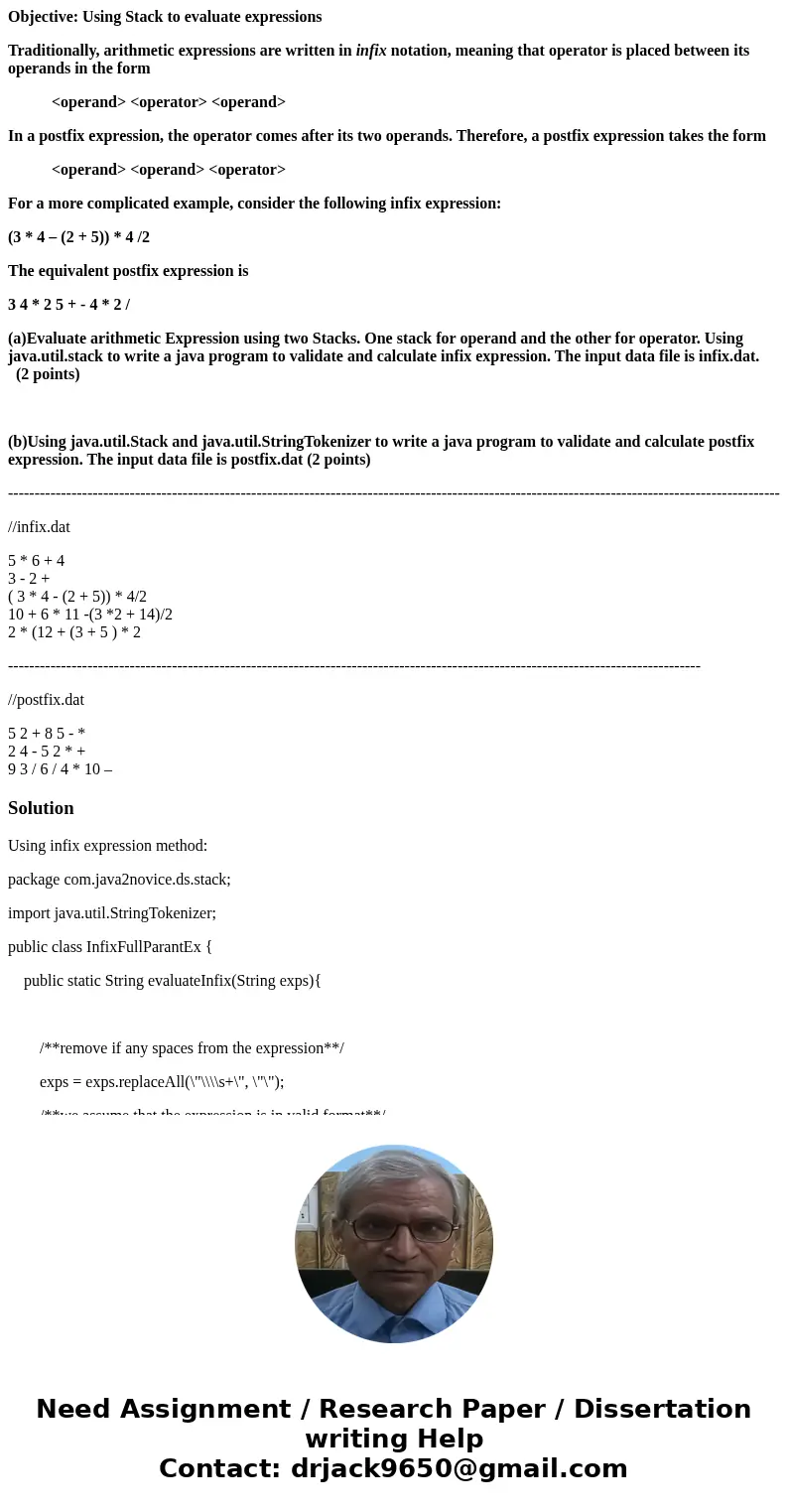
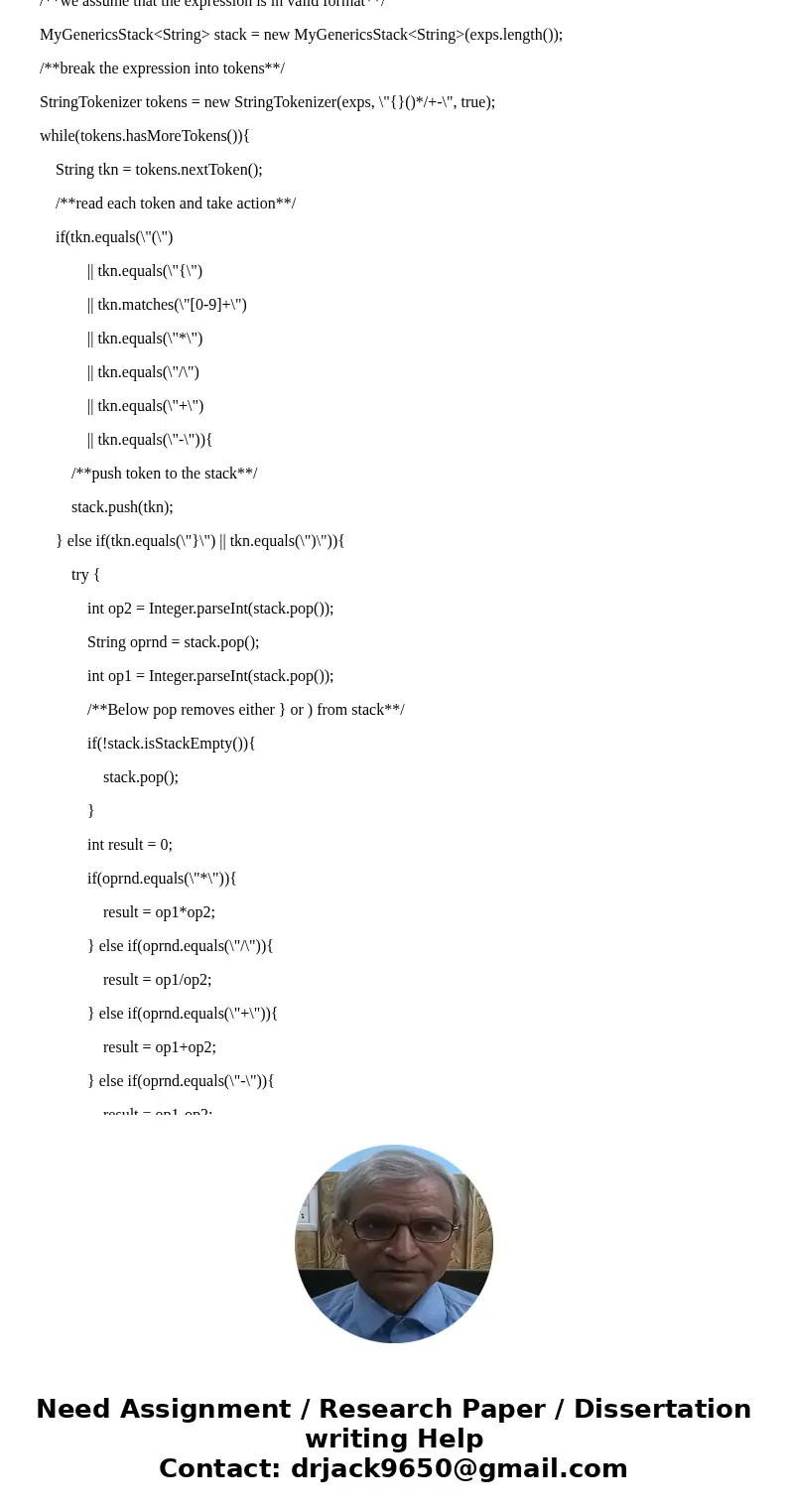
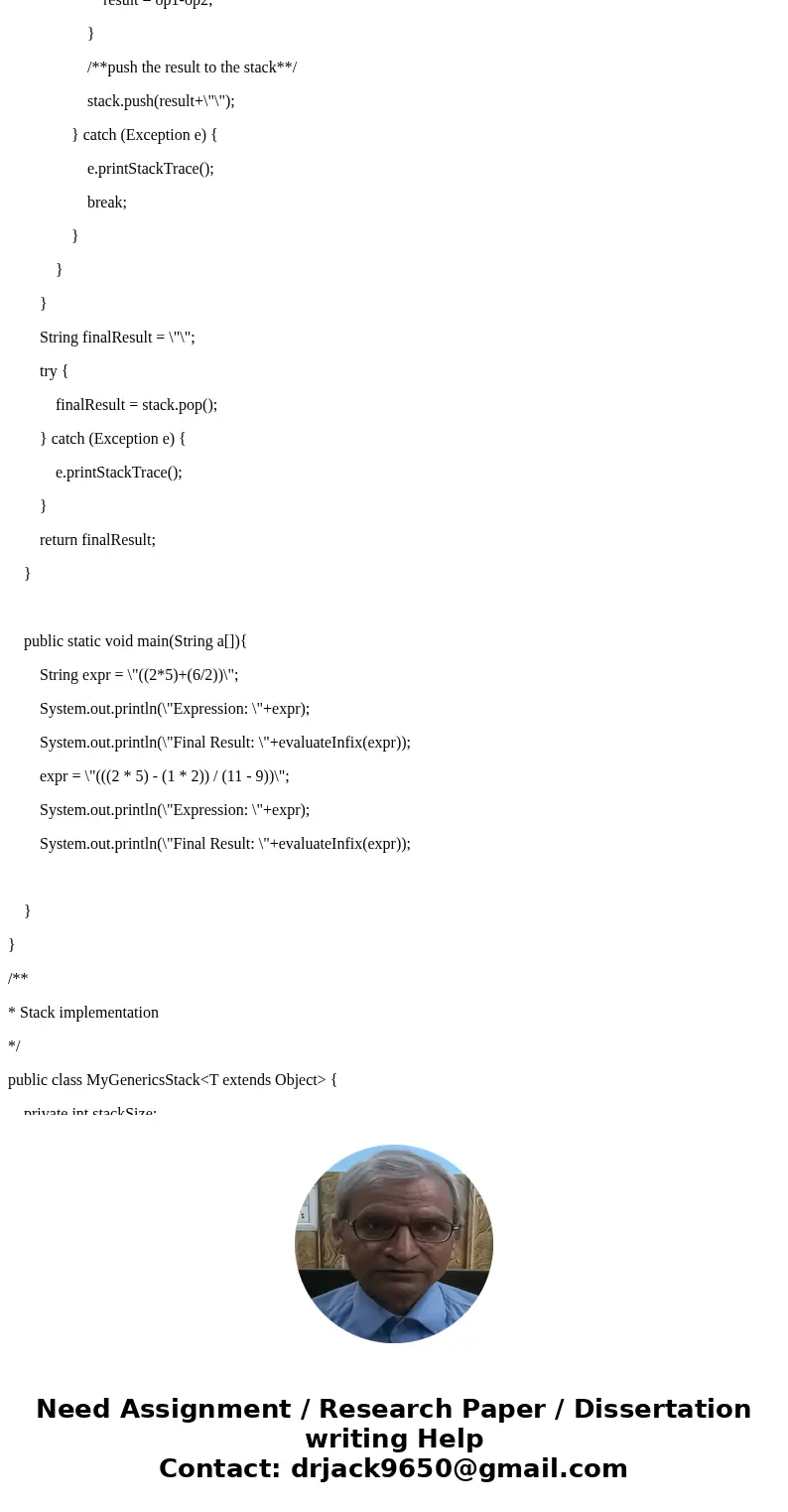
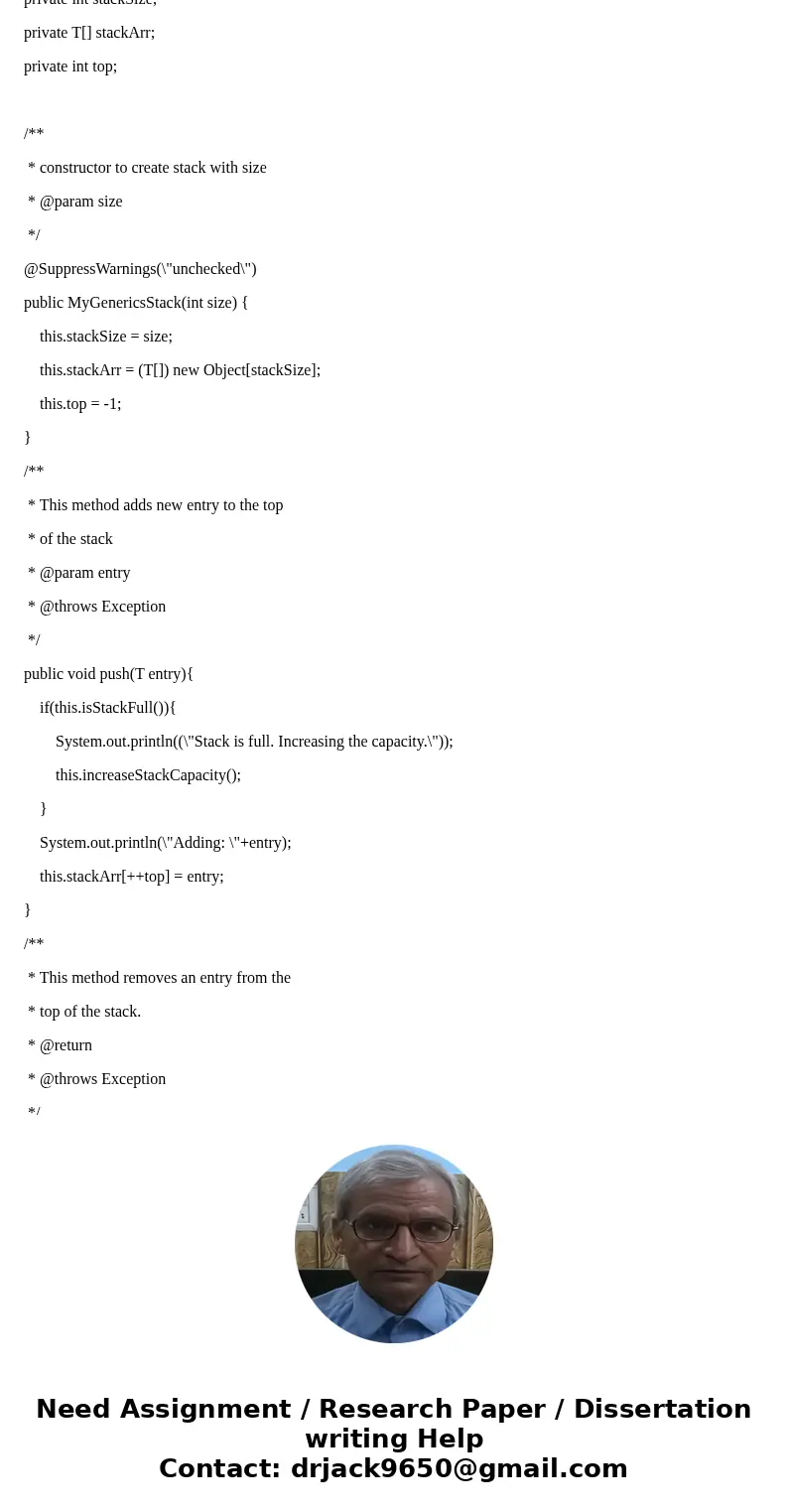
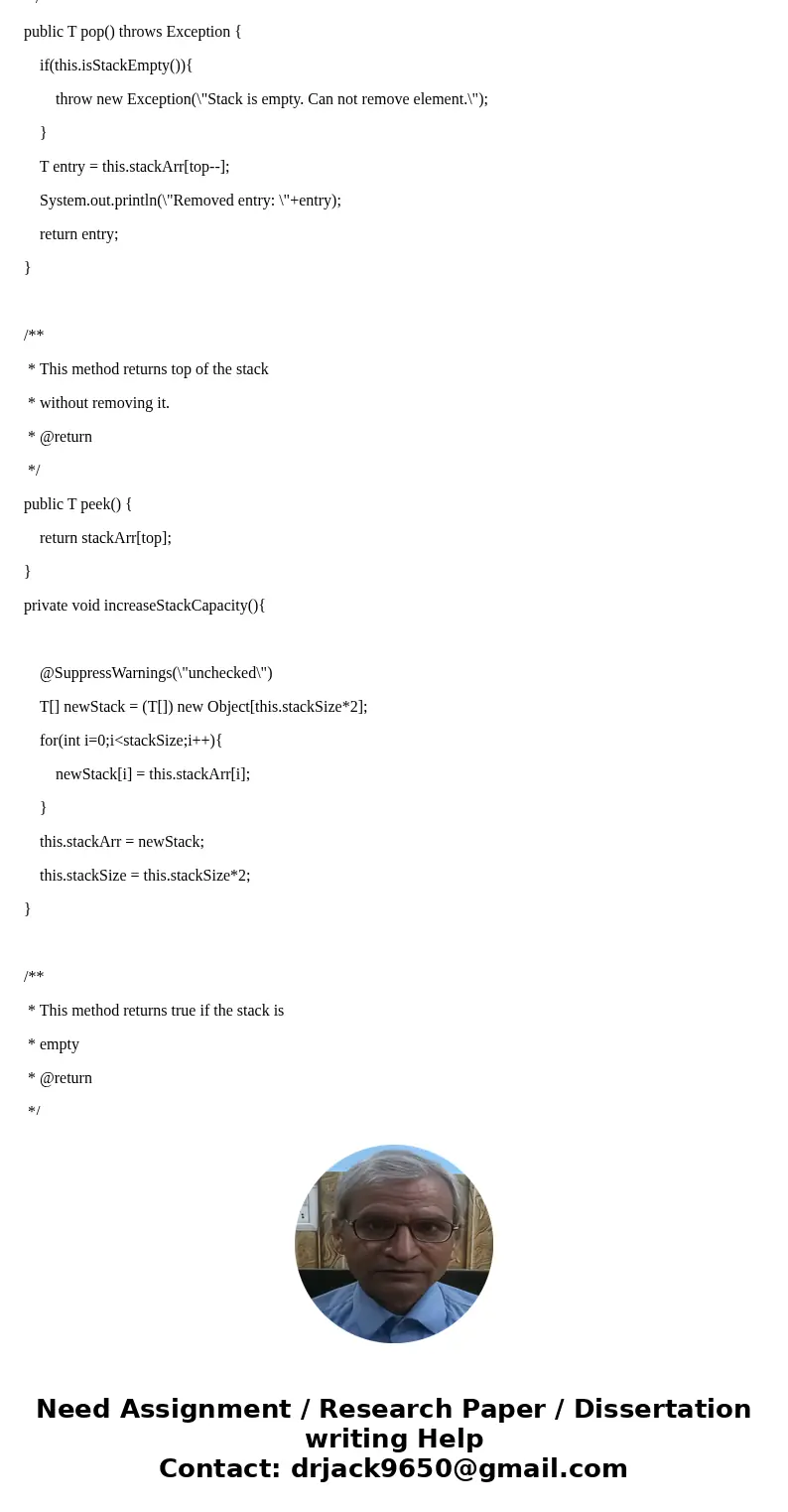
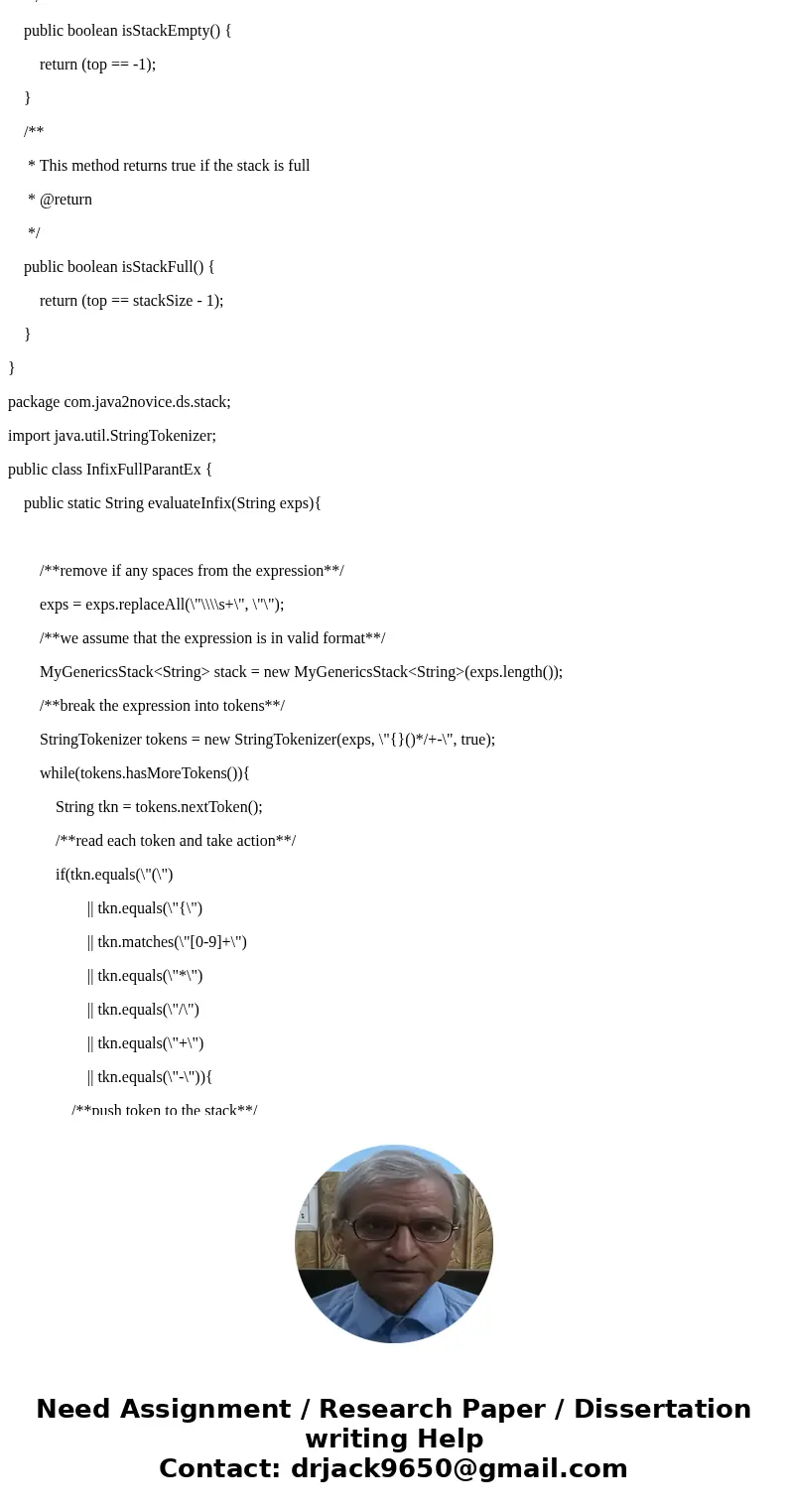
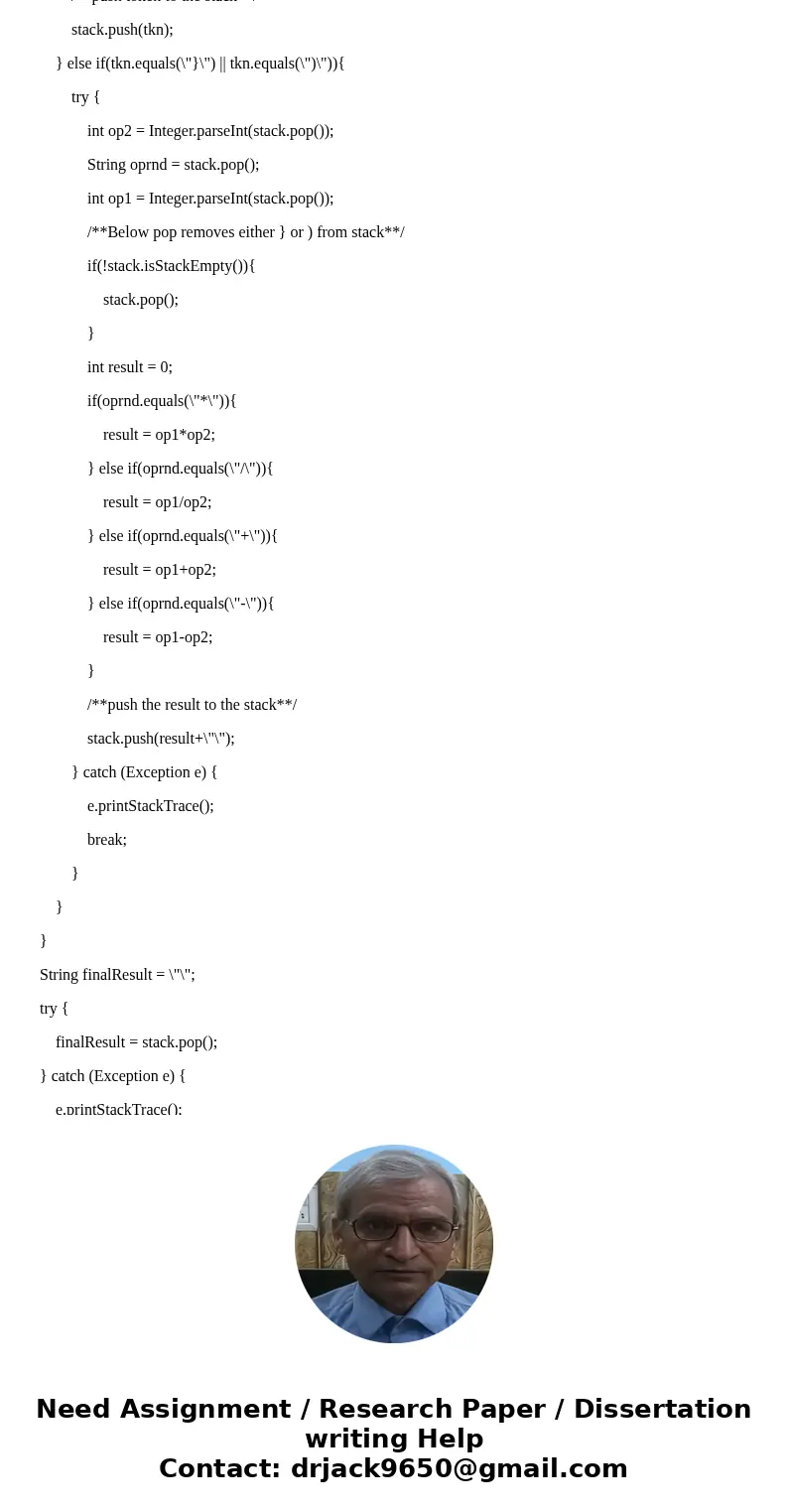
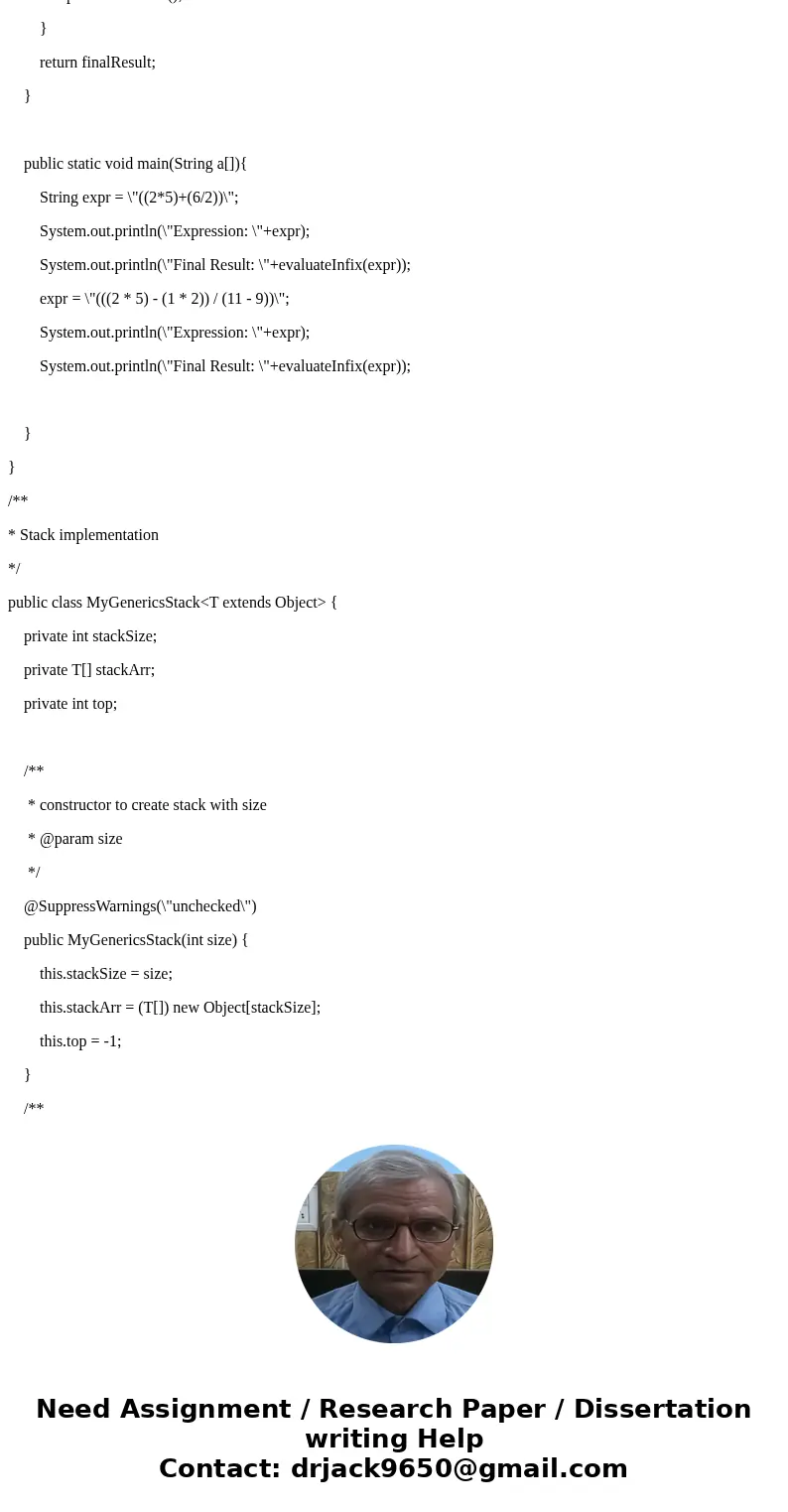
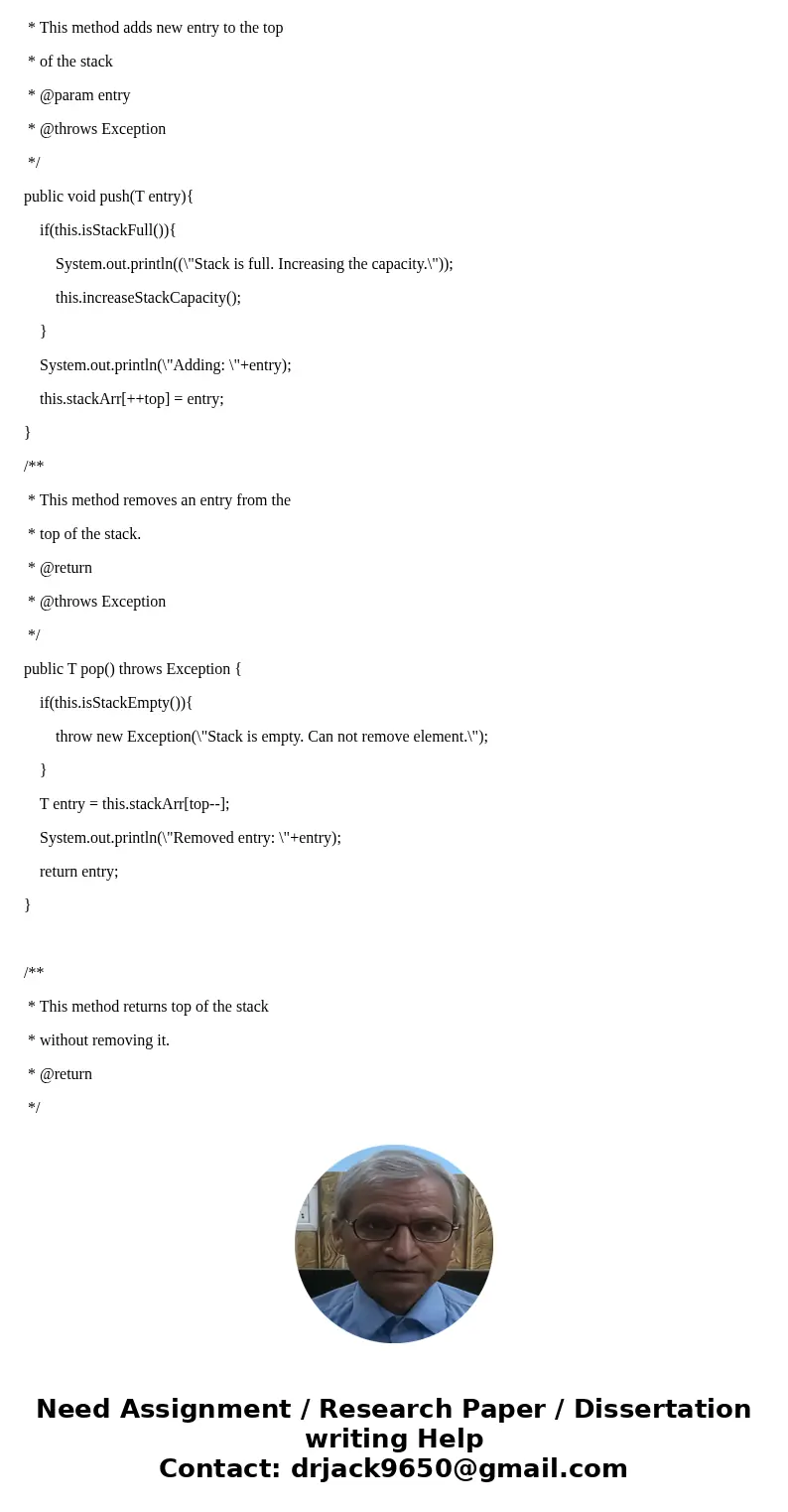
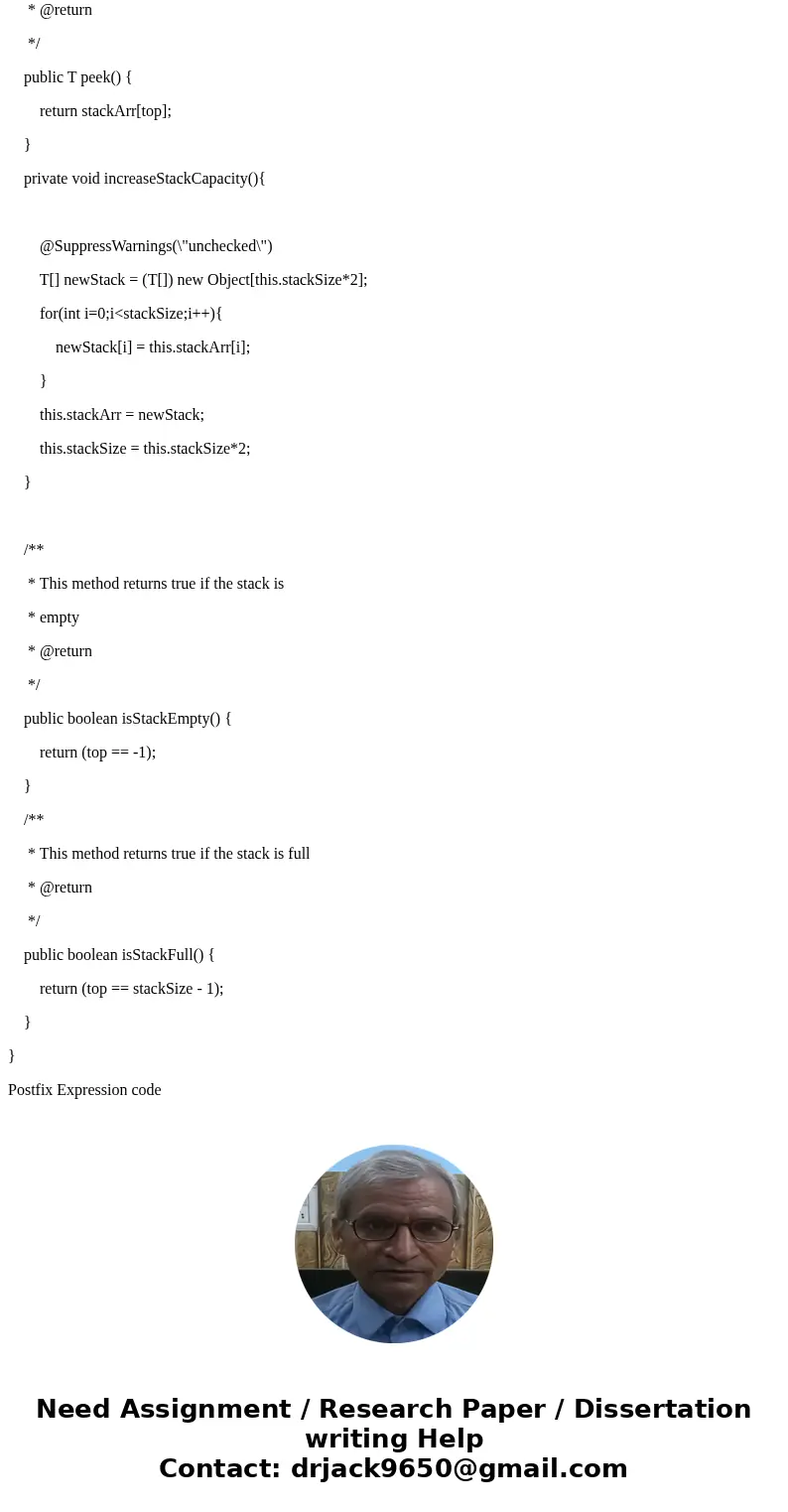
 Homework Sourse
Homework Sourse